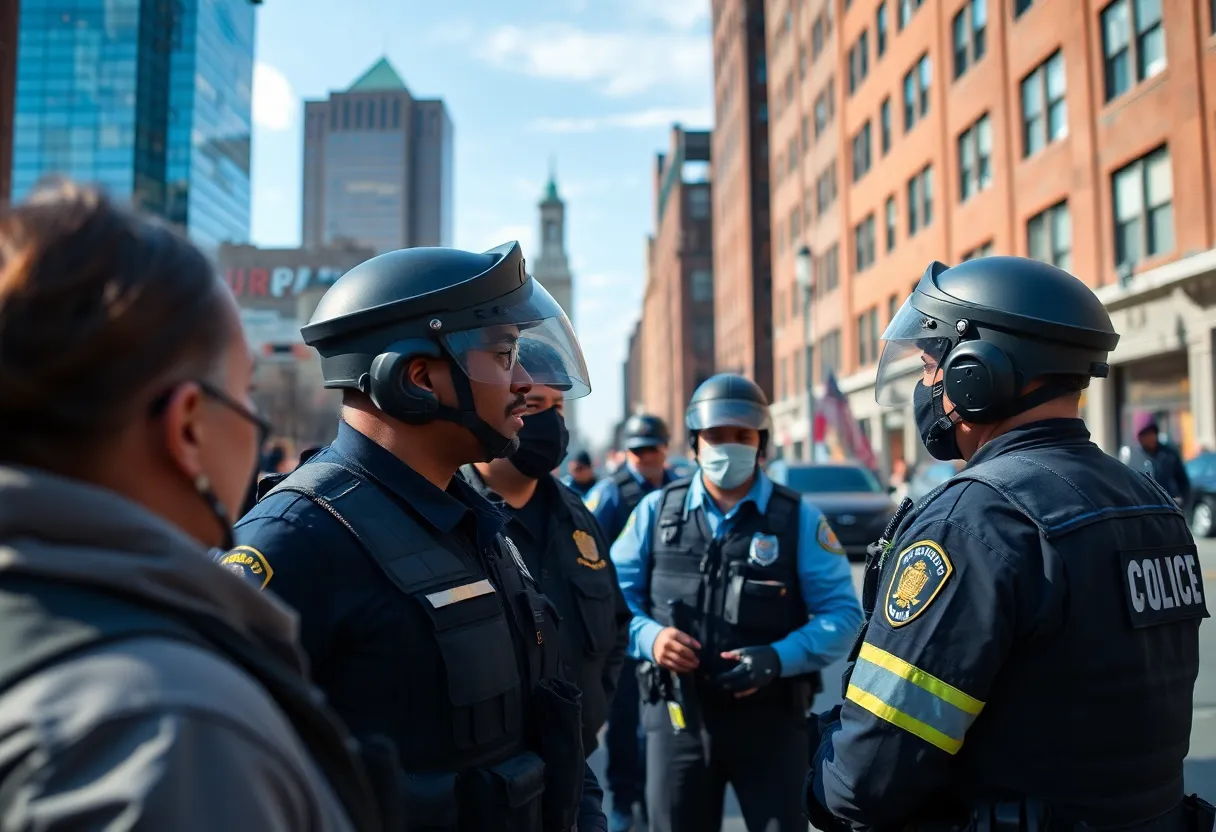Boston, August 20, 2025
News Summary
Boston Mayor Michelle Wu has rejected a federal ultimatum from the U.S. Department of Justice concerning the city’s sanctuary city policies. The DOJ warned that Boston’s practices may violate federal immigration laws and threatened potential criminal charges and loss of federal funding. Mayor Wu reaffirmed Boston’s commitment to uphold its local laws and community safety, citing state law limitations on cooperation with federal immigration enforcement. Other major cities have received similar letters, defending their policies against federal pressure.
Boston — Boston Mayor Michelle Wu has refused to comply with a federal ultimatum from the U.S. Department of Justice regarding the city’s sanctuary city policies, rejecting demands that local practices be altered to increase cooperation with federal immigration enforcement.
Key developments
On August 13 the U.S. Department of Justice sent a letter warning Boston that its status as a sanctuary jurisdiction could be unlawful and that certain local practices may violate federal immigration enforcement laws. The DOJ set an August 19 response deadline and warned that officials who do not comply could face criminal charges and that the city could risk losing federal funding.
Mayor Wu responded by affirming that Boston will not back down and by arguing that the city follows the law and will continue to uphold its values and public safety commitments. Her response noted that Massachusetts state law limits local participation in federal immigration enforcement. Boston is one of 18 jurisdictions identified by the DOJ in similar correspondence.
What the DOJ asked for
The letter from Florida Attorney General Pam Bondi asked sanctuary cities to identify initiatives that would comply with federal immigration enforcement and to eliminate local practices that the DOJ says impede federal authority. The DOJ singled out the Boston Trust Act, a local policy that restricts police involvement in federal immigration actions unless officers have a criminal warrant.
Supporting details and local response
Mayor Wu cited a record of community-focused policing and public safety efforts while rejecting the federal demand. Earlier in her tenure she signed an executive order requiring U.S. Immigration and Customs Enforcement to provide information on its arrests made in Boston. At a City Hall press conference, Wu was joined by local leaders and residents who signaled support for the city’s stance.
Legal analysts contacted after the DOJ letters characterized the federal correspondences as coercive, intended to pressure cities into changing local policies that limit cooperation with federal immigration authorities. Other large cities, including Chicago and Philadelphia, received similar letters and publicly defended their local policies instead of immediately yielding to federal demands.
Law enforcement cooperation and limits
Boston police maintain a history of collaboration with federal authorities on specific issues such as counterterrorism and drug trafficking, a partnership that predates the current mayor’s administration. However, the Trust Act and state legal limits constrain routine local participation in immigration enforcement absent judicial warrants or clear legal authority.
The DOJ’s warning included potential legal actions and the threat of funding cuts if sanctuary jurisdictions do not modify practices. The federal government has previously used conditional grants and litigation to press jurisdictions to increase cooperation with immigration enforcement; the current letters represent a renewed push under federal leadership.
Political reactions
Locally, reactions have varied. Mayor Wu’s political opponent described the DOJ communications as an extreme and discriminatory attack on immigrant communities, while city officials emphasized legal constraints and public safety priorities as reasons for maintaining existing policies.
Background and context
Sanctuary policies have been a point of contention between federal and local authorities for years, with courts and legislatures shaping the boundaries of cooperation. Municipal ordinances and state laws often seek to protect immigrant communities by limiting local involvement in federal immigration enforcement, while federal authorities argue that such limits interfere with national immigration laws and enforcement priorities.
The current confrontation follows a pattern in which federal agencies issue guidance or threats and local governments respond by citing local laws, public safety strategies, and community trust considerations. How disputes over immigration enforcement obligations are resolved often depends on legal challenges, negotiations over grant conditions, and legislative action at state or federal levels.
Next steps
Boston’s response to the DOJ has set the stage for potential litigation, administrative actions, or negotiations. City officials say they will continue to protect residents regardless of immigration status and to rely on established legal frameworks that govern local-federal cooperation.
FAQ
What did the Department of Justice ask Boston to do?
The DOJ asked Boston to identify initiatives to comply with federal immigration enforcement and to remove practices that it says impede federal authority, specifically calling attention to policies like the Trust Act.
What are the potential consequences outlined by the DOJ?
The DOJ warned of possible criminal charges for noncompliant officials and the risk of losing federal funding if a city’s policies obstruct federal immigration enforcement.
Why does Boston say it will not comply?
City officials point to Massachusetts state law that limits local participation in federal immigration enforcement, the Trust Act’s protections requiring a criminal warrant for involvement, and concerns about community trust and public safety.
Have other cities received similar letters?
Yes. At least 18 jurisdictions, including large cities such as Chicago and Philadelphia, received comparable DOJ communications and have similarly defended their local policies.
Quick reference table
| Item | Details |
|---|---|
| City | Boston |
| DOJ letter date | August 13 |
| Response deadline | August 19 |
| Federal official named | Attorney General Pam Bondi (letter author) |
| Policy under scrutiny | Boston Trust Act — limits local police involvement in federal immigration enforcement without a criminal warrant |
| Potential federal actions | Criminal charges for noncompliant officials; risk of losing federal funding; possible litigation |
| Number of jurisdictions identified | 18 |
| Mayor’s position | Refusal to comply; cites state law and public safety priorities |
| Relevant local action | Executive order requiring ICE to report arrests in Boston |
Deeper Dive: News & Info About This Topic
HERE Resources
Boston Mayor Maintains Sanctuary Policies Amid Federal Pressure
Rachel Miselman Campaigns for At-Large Boston City Council Seat
Boston City Council Tensions Rise Over Transparency Issues
Boston Refuses Federal Demand to Dismantle Sanctuary Policies
Boston to Uphold Sanctuary Policies Despite Federal Pressure
Boston Officials Defend Sanctuary Policies Amid Federal Pressure
Boston Mayor Stands Firm on Sanctuary Policies Amid Federal Pressure
Mayor Michelle Wu Defends Boston’s Sanctuary City Policies Amid Migrant Arrests
Boston Rejects Federal Demand on Immigration Policies
Boston Mayor Defends Sanctuary Policies Amid DOJ Deadline
Additional Resources
- WCVB: Wu Responds to Bondi’s Letter
- The Guardian: Boston’s Sanctuary City Policies
- NBC Boston: Boston’s Response to Federal Government
- CBS News: Boston Sanctuary City Policies
- WHDH: Boston’s Response to Trump Administration
- Wikipedia: Sanctuary City
- Google Search: Boston sanctuary city news
- Google Scholar: Boston sanctuary city policies
- Encyclopedia Britannica: Immigration Policy
- Google News: Boston sanctuary city

Author: STAFF HERE BOSTON WRITER
The BOSTON STAFF WRITER represents the experienced team at HEREBoston.com, your go-to source for actionable local news and information in Boston, Suffolk County, and beyond. Specializing in "news you can use," we cover essential topics like product reviews for personal and business needs, local business directories, politics, real estate trends, neighborhood insights, and state news affecting the area—with deep expertise drawn from years of dedicated reporting and strong community input, including local press releases and business updates. We deliver top reporting on high-value events such as Boston Marathon, Head of the Charles Regatta, and Boston Harborfest. Our coverage extends to key organizations like the Greater Boston Chamber of Commerce and Associated Industries of Massachusetts, plus leading businesses in finance, biotech, and insurance that power the local economy such as Fidelity Investments, Biogen, and Liberty Mutual Insurance. As part of the broader HERE network, we provide comprehensive, credible insights into Massachusetts's dynamic landscape.



